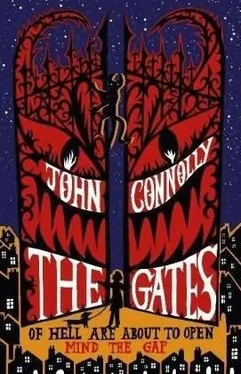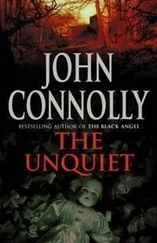I seem to have read a great many books and articles during the writing of this novel, but among the most useful were Black Holes, Wormholes & Time Machines by Jim Al-Khalili (Taylor & Francis, 1999); Quantum Theory Cannot Hurt You by Marcus Chown (Faber and Faber, 2007); and Parallel Worlds by Michio Kaku (Penguin, 2005).
Thanks to Sue Fletcher at Hodder & Stoughton, and Emily Bestler at Atria Books, who I am lucky enough to have as editors; to all of those who work with them, particularly their respective assistants, Swati Gamble and Laura Stern; to Darley Anderson and his staff, without whom my odd little books would not have found homes; and to steve Fisher, for always thinking visually.
Finally, love and thanks to Jennie, as ever, for putting up with me.
John Connolly

***

[1]Scientists call it the “singularity.” People who are religious might call it the mote in God’s eye. Some scientists will say you can’t believe in the singularity and the idea of a god, or gods. Some religious people will try to tell you the same thing. Still, you can believe in the singularity and a god, if you like. It’s entirely up to you. One requires evidence, the other faith. They’re not the same thing, but as long as you don’t get the two mixed up, then everything should be fine.
[2]In fact, about 1 percent of the static that sometimes appears on your television set is a relic of the Big Bang and, if your eyes were sensitive to microwave light instead of just visible light, then the sky at night would appear white instead of black, because it continues to glow from the heat of the Big Bang. Oh, and because atoms are so small, and are constantly recycled, every breath you take contains atoms that were once breathed by Julius Caesar and Elvis Presley. So a little bit of you formerly ruled Rome, and sang “Blue Suede Shoes.”
[3]And even all that stuff added together still amounts to much less than 1 percent of not very much at all, since more than 99 percent of the volume of ordinary matter is empty space. If we could get rid of all the empty space in the atoms of our bodies, the whole of humanity could be squeezed into a matchbox, with room left over for most of the animal kingdom too. Mind you, there would be nobody left to look after the matchbox.
[4]Anyway, the scientists figured, if the end of the world did happen, there wouldn’t be anybody left to blame them. There would probably be just enough time for someone to say, “Hey, you said it wouldn’t cause the end of-” before there was a bit of a bang, and then silence. Scientists, while very intelligent, don’t always think things through. Take, for example, the first caveman who found a nice rock, tied it to a stick with a piece of vine, and thought, “Hmm, I’ve just invented a Thing for Banging Other Things into Things With. I feel certain that nobody will use this to hit someone over the head with instead.” Which someone promptly did. In fact, they probably hit him with it so that they could steal it. This is how we end up with nuclear weapons, and scientists claiming that they’d only set out to invent something that steamed radishes.
[5]Whenever someone uses the word “glitch,” which means a fault of some kind in a system, you should immediately be suspicious, because it means that they don’t know what it is. A technician who uses the term “glitch” is like a doctor who tells you you’re sufferering from a “thingy,” except the doctor won’t tell you to go home and try turning yourself on and off again.
[6]Malevolence, for those of you who were off “sick” from school that day, means hatred, but hatred of a very vicious, evil kind. Incidentally, when you put inverted commas around a word in this way, as I just did around the word “sick,” it means that you don’t really believe that the word in question is true. In this case, I know that you weren’t really sick that day; you just felt like having a morning off to watch children’s television in your pajamas. Hence “sick,” instead of, well, sick. If you really want to annoy someone, you can make little inverted commas by holding up two fingers of each hand and twitching them gently, as though you’re tickling an invisible elf under the armpits. For example, when your mother calls you for dinner, and dinner turns out to be boiled fish and broccoli, you can say to her, “Well, I’ll just eat my ‘dinner,’ then,” and do the little fingers sign. She’ll love it. Seriously. I can hear her laughing already.
[7]This is similar to the old problem about whether or not a tree falling in a forest makes any noise if there is nobody there to hear it. This, of course, assumes that the only creatures worth being concerned about when it comes to falling trees are human beings, and ignores the plight of small birds, assorted rodents, and rabbits who happen to be in the wrong place at the wrong time and find a tree landing on their heads.
In the eighteenth century, a man named Bishop Berkeley claimed that objects only exist because people are there to see them. This led a lot of scientists to laugh at Bishop Berkeley and his ideas, because they found them silly. But according to quantum theory, which is the very advanced branch of physics involving atoms, parallel universes, and other such matters, Bishop Berkeley may have had a point. Quantum theory suggests that the tree exists in all possible states at the same time: burned, sawdust, fallen, or in the shape of a small wooden duck that quacks as it’s pulled along. You don’t know what state it’s in until you observe it. In other words, you can’t separate the observer from the thing being observed.
[8]It was St. Thomas Aquinas, a most learned man who died in 1274, who was supposed to have suggested that an infinite number of angels could dance on the head of a pin. In fact he didn’t, although he spent a lot of time thinking about whether or not angels had bodies (he seemed to think that they didn’t), and how many of them there might be up in heaven (quite a lot, he concluded). The problem with St. Thomas Aquinas was that he liked arguing with himself, and it’s very hard to nail down exactly what he thought about anything at all. Still, the question of how many angels can dance on the head of a pin is probably of interest mainly to philosophers and, one presumes, dancing angels, since the last thing an angel doing the foxtrot wants to worry about is how crowded the pin is getting, and the possibility of falling off the edge and doing himself an injury.
[9]Actually, this is not entirely true. It may well be the case that one cannot prove the existence of a nine-eyed, multitentacled pink monster named Herbert, but that does not mean that, somewhere in the universe, there is not a nine-eyed multitentacled pink monster named Herbert wondering why nobody writes to him. Just because he hasn’t been seen doesn’t mean that he isn’t out there. This is known as an inductive argument. But the argument is probable, not definite. If there’s actually a pretty good chance he exists, there’s at least as good a chance that he doesn’t exist. So you can prove a negative, at least as much as you can prove anything at all.
In addition, again according to quantum theory, there is a probability that all possible events, no matter how strange, may occur, so there is a probability, however small, that Herbert may exist after all.
Still, it’s a good argument with which to confuse schoolteachers and parents, and on that basis alone Samuel is to be applauded.
Читать дальше














